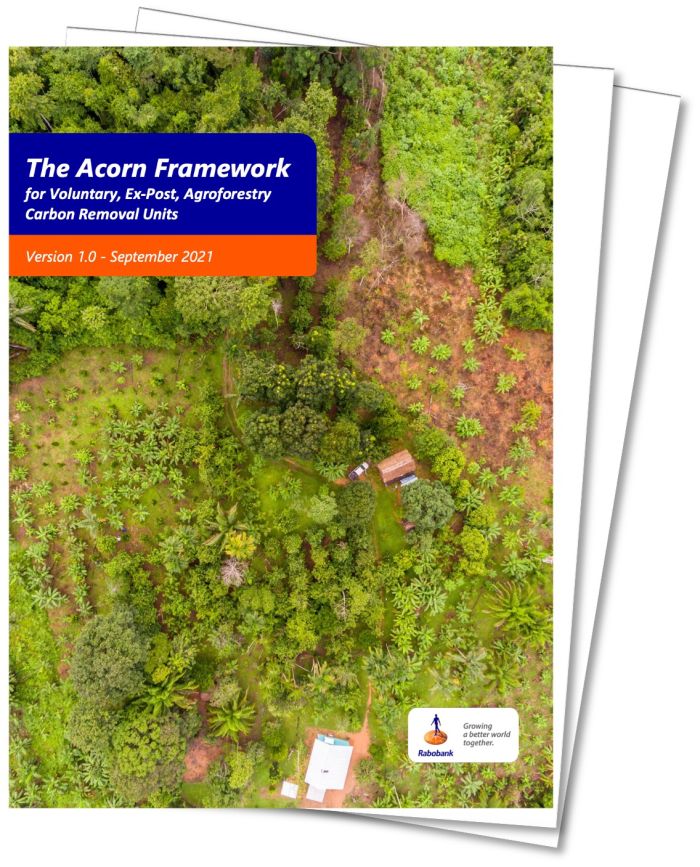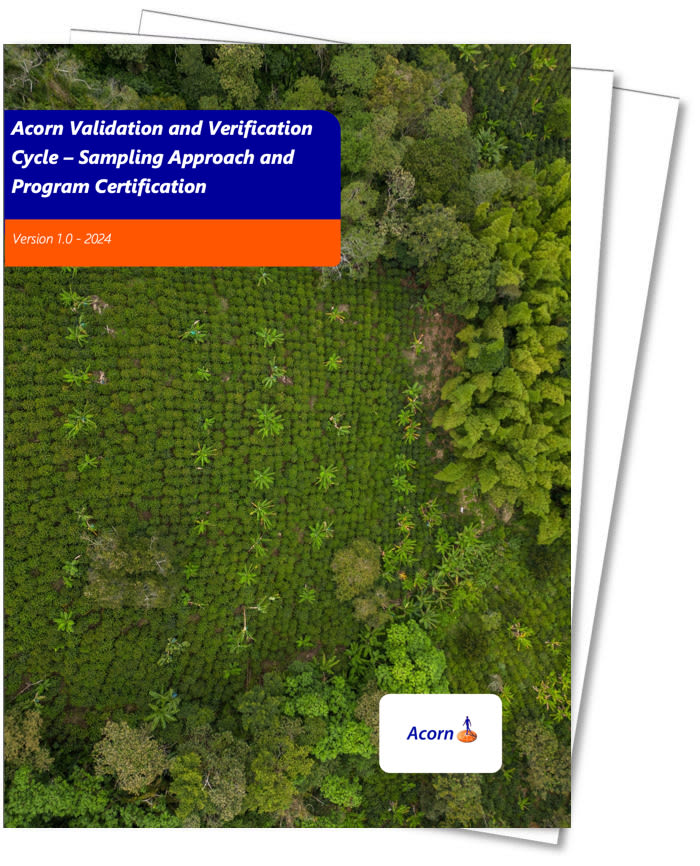
Certification
Unlocking the international voluntary carbon market for smallholder farmers by streamlining the certification activities as a program.
Our principles
Three principles underlie our certification approach: sampling, scalability, and simplification.
Sample
Acorn adopts a standardized approach when sampling monitoring and validation activities are conducted under the Acorn program. The integration of a well-recognized sampling approach ensures Acorn can compare projects and report on results in a manner that is easily interpreted on a global scale.
Scalable
Acorn’s certification approach supports the application of satellite technologies for project monitoring and evaluation. The use of data from such high-quality remote sources significantly reduces costs and increases scalability.
Simple
The Acorn Framework introduces a simplified approach for implementing agroforestry and reporting results at both farmer and project level.
These three principles ensure that the burden of getting projects certified is lifted from project coordinators and the smallholder farmers they represent. We’ve made the process easier for them and take on as much of it as we can, so they can focus on other things—afforestation and decarbonization should take precedence over paperwork, after all.
The Acorn Framework
Acorn has developed its own tailor-made approach for a more scalable and inclusive certification process directed at small-scale agroforestry projects. Acorn’s certification approach and the requirements projects must adhere to, are described in the Acorn Framework.

The Acorn Methodology
The complementary Acorn Methodology describes the processes involved when measuring and calculating carbon removal units. The Methodology has been externally assessed and approved by the Plan Vivo Foundation and an accredited validation and verification body: AENOR.
Now available is the latest methodology and an Errata to describe improvements/corrections made going from Methodology version 1.0 to Methodology version 1.1. From this moment onwards version 1.1 will be the methodology followed for all Acorn projects.
> Download the Acorn Methodology v1.1 here
> Download the Acorn Errata here

How certification works
To successfully certify a project and the CRUs generated, a project will be first assessed in terms of eligibility and additionality. A range of baseline data is collected, describing the current livelihood and environmental conditions in the project area, and demonstrating that the required structures and processes outlined in the Acorn Framework are in place at the start of the project.

Validation and Verification Cycle
The Sampling Approach and Program Certification document, details the Certifier-approved sampling approach and processes Acorn takes towards confirming the veracity of its projects and program.

Validation and Verification Assessments
The Acorn program consists of multiple projects around the globe that apply the same carbon removal interventions and measurement technologies. Unlike other carbon removal standards, certified Acorn projects (that have submitted an Acorn Design Document (ADD)) can issue Carbon Removal Units (CRUs) before an independent third-party expert audits them, allowing for projects to scale up faster, reduce operational costs and increase accessibility to the Voluntary Carbon Market for smallholder farmers.
Every year, a sample of projects is selected using Acorn’s Certifier-approved sampling approach (document pending). Sampled projects are then submitted to the Certifier for desk review and to an independent Validation and Verification Body (VVB), selected according to the criteria in the Acorn Framework, to conduct a field audit on the sampled projects. Their collective findings identify measures, if any, that need to be taken to ensure the Acorn program and our projects are issuing valid and verifiable CRUs.
There are two assessments that a VVB performs on Acorn projects: validation, executed once per project, and verification, which can be executed more than once per project. Validation refers to a full review of the information recorded in the ADD, as well as an assessment of the knowledge, capacity and functionality of the project coordinator and project participants. With verification, the accuracy, completeness, quality, and veracity of information provided in the annual report, carbon calculations for quality assurance of CRUs issued, and any revisions to the ADD made during the verification period are assessed. This includes verifying the number of CRUs issued by the project since the previous verification.
In 2022 two projects were audited, FarmStrong Côte d’Ivoire and Solidaridad Colombia. In 2023, four projects were audited, Trees for Kenya, Farm Africa, Solidaridad Uganda and AFEC India (the last two reports are pending). For 2024, the selected projects include WETPA Kenya, Kaderes Tanzania, Solidaridad Nicaragua, and Solidaridad Peru.
Downloads

Acorn Biomass Model Report
This document gives a high-level summary of the Acorn biomass calculation model, which is used to calculate the biomass changes in trees planted on smallholder farms. This includes an overview of the areas to which the model is applied, the selection of the modelling algorithm and its input features, as well as an overview of the model’s accuracy expressed in R2 and normalized RMSE, two of the most widely used statistical measures for accuracy. Additionally, this document gives a high-level summary of the independent internal validation of the Acorn biomass calculation model and its results.

Subscribe to our newsletter
Stay updated on our Acorn activities and the latest carbon news